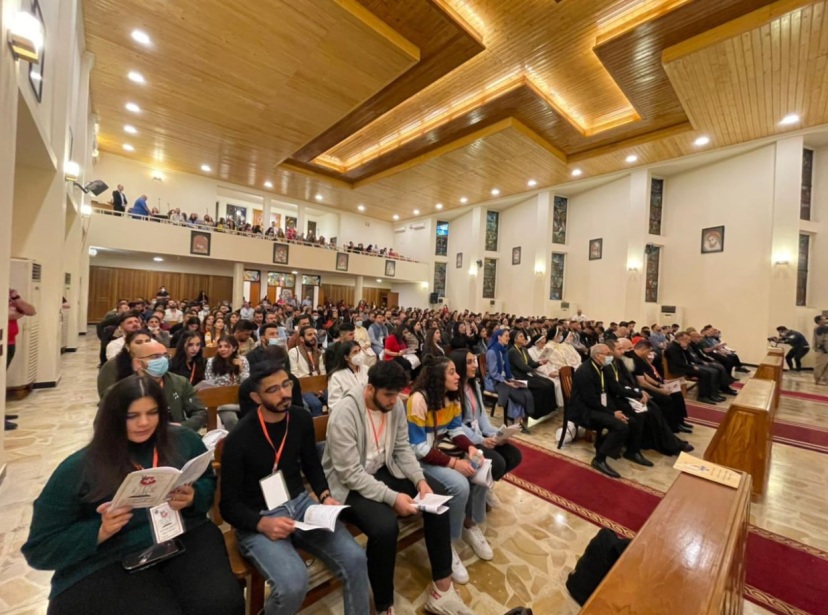ROME – As thousands of young Catholics around the world celebrated diocesan World Youth Day on the feast of Christ the King on Sunday, the Chaldean youth in war-torn Iraq were no exception, with a weekend-long meeting that brought together 450 women and men from the country’s eight dioceses.
The purpose of the meeting, said Father Karam Shamasha, from the Nineveh Plains in northern Iraq, was “for the youth to get to know each other and renew their encounter with the living Christ.”
Under the header of “You are a living Church,” the Nov. 18-20 gathering of the Chaldean youth was the first of its kind, but organizers hope it can become an annual event.
According to Shamasha, who attended the gathering, the theme for this year’s meeting derives from Pope Francis’s homily in the Franco Hariri Stadium in Erbil, in March of this year. “You are a living and strong Church,” the pontiff had told the local Catholic community, that welcomed him with open arms after years of persecution and oppression in the hands of terrorist organization ISIS.
Most of this weekend’s activities were heldat St. Joseph’s Chaldean Cathedral in Baghdad, with young Chaldean Catholics from all over the country taking part.
The celebrations included prayer, reflections, sharing of experiences as part of the global consultation launched by Pope Francis ahead of the Synod of Bishops on Synodality, and a Mass celebrated by Cardinal Luis Raphael Sako, Patriarch of the Chaldean Church.
“I would like to express to each of you my closeness and understanding for the difficulties and emergencies you are facing, but also to tell you that there is no reason to despair,” Sako told the youth when he welcomed them on Friday. “The Lord calls us to be a living and strong Church, a Church that bears his word, his love and his salvation.”
The patriarch also said that that the Chaldean authorities had long wanted to convene the gathering, but the violence that reigned in the country, together with the lack of security to travel and later the COVID-19 pandemic, had made it impossible until now.
Sako also said that young Christians in Iraq have experienced martyrdom – thousands were killed by ISIS between 2014 and 2017, when the terrorist group ruled over most of the country – and called them “our pride,” emphasizing the fact that young generations don’t have a “decorative function” in the Church. On the contrary, he argued, their talents, thoughts and creative impetus are needed.
On Sunday, according to Shamasha, the patriarch urged the youth to pray for Iraq and for our Lord to bring His peace to all the Middle East.”
“His Beatitude also explained the value of human life that is lived for a purpose, whether in married or consecrated life, and the need for the youth to know where to go to engage in community service without fear, for a Christian is never afraid,” the priest toldCrux on Wednesday.
“The problem of our Christian youth today is instability, lack of jobs, lack of confidence in the leaders of the State and the future, and the loss of identity,” Shamasha said. “The recent wars, especially the occupation of ISIS, had clear effects on the political, economic, cultural, and social structures, as well as on spiritual structures. Despite the commitment of several groups of them to the spiritual and apostolic life, the Chaldean youth, in general, like others, live in the complex, diverse, changing, vast and limitless world, and they face the challenges of life in it. This is due to globalization, which they are strongly and enthusiastically rushing to engage in, through all kinds of means of communication.”
The priest also noted that the painful political reality exhausts the economic, social and cultural structures, and impedes comprehensive development attempts that should be devoted to serving society in all its categories, and from which the youth should benefit. The stifling economic crisis is taking on, day after day, the features of underdevelopment.
“In Iraq, where wealth is not evenly distributed, laws are arbitrarily applied, and oversight institutions are disrupted, confidence in the national economy is lost, and projects are frozen,” Shamasha said. “Young people hesitate to marry and start a family. The consequences of this on the moral and demographic level are not hidden. As for those married among them, they face difficulty in securing a decent standard of living for themselves and their family members, a difficulty that exposes them to the risks of family disintegration.”
Amid this painful reality, the Church’s initiatives for the youth, whether on the spiritual level, or on the developmental and social level, come as a sign of hope, the priest said: Although they realize that the Church cannot take the place of the State, they appreciate the institution’s attempts to care for them, with both spiritual and material aid.
“This meeting came to confirm that although we have remained like a small herd in Iraq, we are still strong like yeast, salt and light, and we must, prepare ourselves and our home to face the current and upcoming challenges through awareness, faith, determination, confidence, hope and unity as one,” Shamasha said. “The youth is the present and the brilliant future of the Church and society.”
Source: cruxnow






